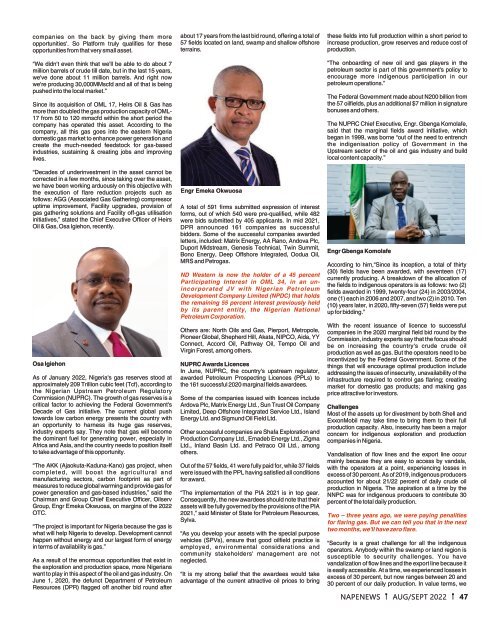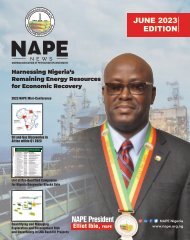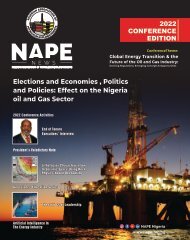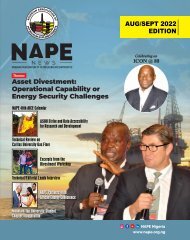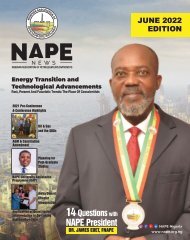You also want an ePaper? Increase the reach of your titles
YUMPU automatically turns print PDFs into web optimized ePapers that Google loves.
companies on the back by giving them more<br />
opportunities'. So Platform truly qualifies for these<br />
opportunities from that very small asset.<br />
“We didn't even think that we'll be able to do about 7<br />
million barrels of crude till date, but in the last 15 years,<br />
we've done about 11 million barrels. And right now<br />
we're producing 30,000MMscfd and all of that is being<br />
pushed into the local market.”<br />
Since its acquisition of OML 17, Heirs Oil & Gas has<br />
more than doubled the gas production capacity of OML-<br />
17 from 50 to 120 mmscfd within the short period the<br />
company has operated this asset. According to the<br />
company, all this gas goes into the eastern Nigeria<br />
domestic gas market to enhance power generation and<br />
create the much-needed feedstock for gas-based<br />
industries, sustaining & creating jobs and improving<br />
lives.<br />
“Decades of underinvestment in the asset cannot be<br />
corrected in a few months, since taking over the asset,<br />
we have been working arduously on this objective with<br />
the execution of flare reduction projects such as<br />
follows: AGG (Associated Gas Gathering) compressor<br />
uptime improvement, Facility upgrades, provision of<br />
gas gathering solutions and Facility off-gas utilisation<br />
initiatives,” stated the Chief Executive Officer of Heirs<br />
Oil & Gas, Osa Igiehon, recently.<br />
Osa Igiehon<br />
As of January <strong>2022</strong>, Nigeria's gas reserves stood at<br />
approximately 209 Trillion cubic feet (Tcf), according to<br />
the Nigerian Upstream Petroleum Regulatory<br />
Commission (NUPRC). The growth of gas reserves is a<br />
critical factor to achieving the Federal Government's<br />
Decade of Gas initiative. The current global push<br />
towards low carbon energy presents the country with<br />
an opportunity to harness its huge gas reserves,<br />
industry experts say. They note that gas will become<br />
the dominant fuel for generating power, especially in<br />
Africa and Asia, and the country needs to position itself<br />
to take advantage of this opportunity.<br />
“The AKK (Ajaokuta-Kaduna-Kano) gas project, when<br />
completed, will boost the agricultural and<br />
manufacturing sectors, carbon footprint as part of<br />
measures to reduce global warming and provide gas for<br />
power generation and gas-based industries,” said the<br />
Chairman and Group Chief Executive Officer, Oilserv<br />
Group, Engr Emeka Okwuosa, on margins of the <strong>2022</strong><br />
OTC.<br />
“The project is important for Nigeria because the gas is<br />
what will help Nigeria to develop. Development cannot<br />
happen without energy and our largest form of energy<br />
in terms of availability is gas.”<br />
As a result of the enormous opportunities that exist in<br />
the exploration and production space, more Nigerians<br />
want to play in this aspect of the oil and gas industry. On<br />
June 1, 2020, the defunct Department of Petroleum<br />
Resources (DPR) flagged off another bid round after<br />
about 17 years from the last bid round, offering a total of<br />
57 fields located on land, swamp and shallow offshore<br />
terrains.<br />
Engr Emeka Okwuosa<br />
A total of 591 firms submitted expression of interest<br />
forms, out of which 540 were pre-qualified, while 482<br />
were bids submitted by 405 applicants. In mid 2021,<br />
DPR announced 161 companies as successful<br />
bidders. Some of the successful companies awarded<br />
letters, included: Matrix Energy, AA Rano, Andova Plc,<br />
Duport Midstream, Genesis Technical, Twin Summit,<br />
Bono Energy, Deep Offshore Integrated, Oodua Oil,<br />
MRS and Petrogas.<br />
ND Western is now the holder of a 45 percent<br />
Participating Interest in OML 34, in an unincorporated<br />
JV with Nigerian Petroleum<br />
Development Company Limited (NPDC) that holds<br />
the remaining 55 percent interest previously held<br />
by its parent entity, the Nigerian National<br />
Petroleum Corporation.<br />
Others are: North Oils and Gas, Pierport, Metropole,<br />
Pioneer Global, Shepherd Hill, Akata, NIPCO, Aida, YY<br />
Connect, Accord Oil, Pathway Oil, Tempo Oil and<br />
Virgin Forest, among others.<br />
NUPRC Awards Licences<br />
In June, NUPRC, the country's upstream regulator,<br />
awarded Petroleum Prospecting Licences (PPLs) to<br />
the 161 successful 2020 marginal fields awardees.<br />
Some of the companies issued with licences include<br />
Ardova Plc, Matrix Energy Ltd., Sun Trust Oil Company<br />
Limited, Deep Offshore Integrated Service Ltd., Island<br />
Energy Ltd. and Sigmund Oil Field Ltd.<br />
Other successful companies are Shafa Exploration and<br />
Production Company Ltd., Emadeb Energy Ltd., Zigma<br />
Ltd., Inland Basin Ltd. and Petraco Oil Ltd., among<br />
others.<br />
Out of the 57 fields, 41 were fully paid for, while 37 fields<br />
were issued with the PPL having satisfied all conditions<br />
for award.<br />
“The implementation of the PIA 2021 is in top gear.<br />
Consequently, the new awardees should note that their<br />
assets will be fully governed by the provisions of the PIA<br />
2021,” said Minister of State for Petroleum Resources,<br />
Sylva.<br />
“As you develop your assets with the special purpose<br />
vehicles (SPVs), ensure that good oilfield practice is<br />
employed, environmental considerations and<br />
community stakeholders' management are not<br />
neglected.<br />
“It is my strong belief that the awardees would take<br />
advantage of the current attractive oil prices to bring<br />
these fields into full production within a short period to<br />
increase production, grow reserves and reduce cost of<br />
production.<br />
“The onboarding of new oil and gas players in the<br />
petroleum sector is part of this government's policy to<br />
encourage more indigenous participation in our<br />
petroleum operations.”<br />
The Federal Government made about N200 billion from<br />
the 57 oilfields, plus an additional $7 million in signature<br />
bonuses and others.<br />
The NUPRC Chief Executive, Engr. Gbenga Komolafe,<br />
said that the marginal fields award initiative, which<br />
began in 1999, was borne “out of the need to entrench<br />
the indigenisation policy of Government in the<br />
Upstream sector of the oil and gas industry and build<br />
local content capacity.”<br />
Engr Gbenga Komolafe<br />
According to him,“Since its inception, a total of thirty<br />
(30) fields have been awarded, with seventeen (17)<br />
currently producing. A breakdown of the allocation of<br />
the fields to indigenous operators is as follows: two (2)<br />
fields awarded in 1999, twenty-four (24) in 2003/2004,<br />
one (1) each in 2006 and 2007, and two (2) in 2010. Ten<br />
(10) years later, in 2020, fifty-seven (57) fields were put<br />
up for bidding.”<br />
With the recent issuance of licence to successful<br />
companies in the 2020 marginal field bid round by the<br />
Commission, industry experts say that the focus should<br />
be on increasing the country's crude crude oil<br />
production as well as gas. But the operators need to be<br />
incentivized by the Federal Government. Some of the<br />
things that will encourage optimal production include<br />
addressing the issues of insecurity, unavailability of the<br />
infrastructure required to control gas flaring; creating<br />
market for domestic gas products; and making gas<br />
price attractive for investors.<br />
Challenges<br />
Most of the assets up for divestment by both Shell and<br />
ExxonMobil may take time to bring them to their full<br />
production capacity. Also, insecurity has been a major<br />
concern for indigenous exploration and production<br />
companies in Nigeria.<br />
Vandalisation of flow lines and the export line occur<br />
mainly because they are easy to access by vandals,<br />
with the operators at a point, experiencing losses in<br />
excess of 30 percent. As of 2019, indigenous producers<br />
accounted for about 21/22 percent of daily crude oil<br />
production in Nigeria. The aspiration at a time by the<br />
NNPC was for indigenous producers to contribute 30<br />
percent of the total daily production.<br />
Two – three years ago, we were paying penalities<br />
for flaring gas. But we can tell you that in the next<br />
two months, we'll have zero flare.<br />
“Security is a great challenge for all the indigenous<br />
operators. Anybody within the swamp or land region is<br />
susceptible to security challenges. You have<br />
vandalization of flow lines and the export line because it<br />
is easily accessible. At a time, we experienced losses in<br />
excess of 30 percent, but now ranges between 20 and<br />
30 percent of our daily production. In value terms, we<br />
NAPENEWS AUG/SEPT <strong>2022</strong> 47


